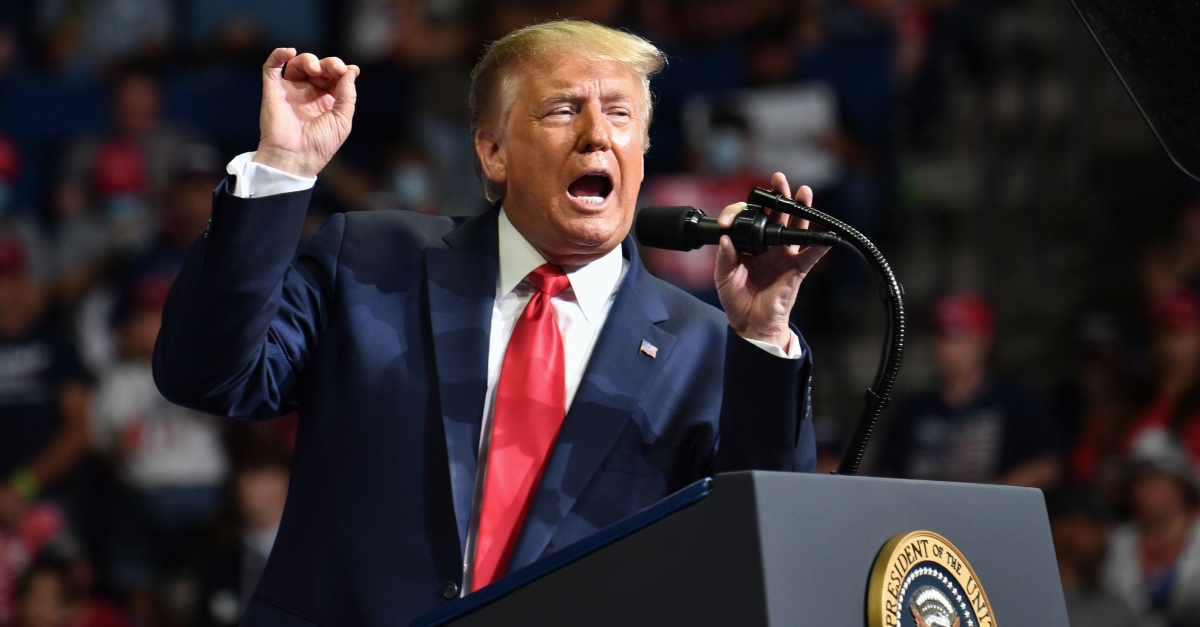
President Donald Trump’s new man at the Department of Defense once called Barack Obama a “terrorist leader,” which is at least partly why his nomination before the Senate was doomed to fail. Although he failed to secure Republican support in the Senate, Anthony Tata is now a top official at the Pentagon anyway–by way of a legal loophole the White House has eagerly exploited time and time again.
In late April, retired general and former Fox News commentator Tata was announced as the 45th president’s intended pick to serve as the next Under Secretary of Defense for Policy (the third-highest ranking position in the Department of Defense). In early June, Trump formally nominated Tata to the post by sending his nominating papers to the Senate Committee on Armed Services.
But the very next day, a series of extreme and offensive statements made by Tata put his Senate approval odds in doubt.
CNN’s Em Steck, Andrew Kaczynski and Nathan McDermott uncovered the above-mentioned Obama reference as well as numerous instances of Islamophobia made via Twitter, including the falsehood that Obama is a Muslim. Tata also made several derogatory references to other Democratic Party politicians like Rep. Maxine Waters (D-Calif.)
Senate Democrats raised red flags about the proposed nominee a few days later–saying he was Trump’s most unqualified pick to date–as additional incendiary tweets emerged. Again, Tata’s statements showed a deep-seated preoccupation with Obama.
Exactly one week after Tata’s nomination was formalized, a group of retired generals loudly announced they wanted to pull the plug on their colleague’s nomination and formally withdrew their support.
Tata’s prospects vanished after that Twitter-based downward spiral. He is, however, currently serving as the Pentagon’s number three.
On Sunday evening, Tata formally withdrew his name for consideration. On Sunday evening, the Trump administration gave him the job anyway due to that aforementioned legal loophole.
“Mr. Tata withdrew from consideration before the Senate Armed Services Committee his nomination to be the Undersecretary of Defense for Policy,” the Department of Defense said in a statement. “He has been designated as the official Performing the Duties of the Deputy Undersecretary of Defense for Policy reporting to the Acting Undersecretary of Defense for Policy Dr. James Anderson.”
Some legal experts cried foul.
University of Texas Law Professor Steve Vladeck noted that the Federal Vacancies Reform Act “bars Tata from being named the Acting Undersecretary because he was nominated to the same job.” The only way around that provision is if Tata serves for 90 days as the “first assistant to the office of such officer.”
“This is all a naked end-run around 5 U.S.C. § 3345(b),” Vladeck said via Twitter. “That clock is now running.”
Vladeck went on to say the Tata situation was “especially ridiculous” because he was nominated for the role but only withdrew “because he wasn’t going to get confirmed.”
“It’s a pretty messed-up system when the guy who the Senate was about to nix can effectively end up with the same job anyway,” he added.
It is the system that the U.S. Congress devised.
The Trump administration has been particularly adept–though not flawless–at using those loopholes to sidestep longstanding interpretations of federal succession rules by dancing around norms and simply appointing acting officials in lieu of grueling and perhaps embarrassing Senate confirmations.
Acting Department of Homeland Security Secretary Chad Wolf only assumed his current position after both an official watchdog and a court ruled that Ken Cuccinelli could not be moved up to helm the controversial law enforcement agency because he had not held a role that was equivalent to the federal “first assistant” requirement.
Tata’s nomination appears to be a novel interpretation of the statute once again.
Brookings Institution Senior Fellow and Obama administration alum Norm Eisen offered an extreme view of Tata’s technicality-enabled star ascendant.
“Trump’s wholesale use of actings has crossed the line to be impeachable,” he claimed–apparently unfamiliar with the intricacies of the federal law. “Art II, Sec 2 of the Constitution requires Senate Advice [and] Consent for ‘all other Officers of the United States’.”
Eisen then suggested people interested in the issue should buy his book.
[image via via NICHOLAS KAMM/AFP via Getty Images]